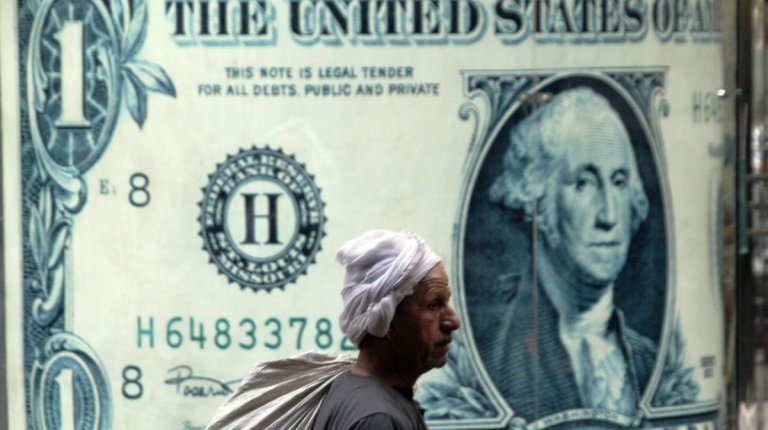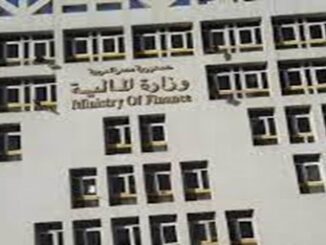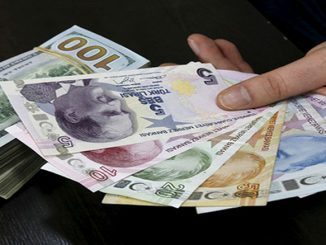
Business is in a near-halt in Egypt as companies struggle to keep pace with a rapid slide in the black-market value of the pound, according to a report published by Reuters on Tuesday.
A sense of panic is spreading in business as factories are halting their production and shops are running low on stocks.
The owner of a company that imports, processes, and packages coffee and spices, Bassem Hussein said that he stopped buying two weeks ago as a result of the decline in the Egyptian currency. His goods are still on sale at supermarkets but no more stock is on the way for now.
He said, “No one knows what is happening. We stopped buying and selling two weeks ago. We’re only doing retail.” “It’s not logical and it’s not just us, it’s all merchants.”
The Egyptian pound has been declining on the parallel market as tourism and foreign investment, the vital sources of hard currency in Egypt, withdrawal as a result of security unrest and political instability.
However, firms say “a dramatic slide in the last few weeks has left them paralyzed, unable to plan from one day to the next.”
Reuters reported that black market traders were buying dollars at 17.5-17.85 pounds on Monday and selling them to importers at 18-18.2, “representing a two-pound slide in a single week and five-pound slide on the month.”
The pound is now worth half as much on the black market as it is in the banks, where the official rate remains fixed at 8.8 but where dollar supplies are strictly rationed.
Moreover, foreign reserves have dropped from $36 billion before 2011 to about $19.6 billion in September although Egypt was receiving tens of billions of dollars in aid from its Gulf Arab allies.
In early 2015, capital controls introduced to prioritize essentials such as wheat have forced importers on to the black market, where the rate has reduced fast.
Business in Egypt is in trouble
For nearly two years, companies have complained that the dollar crisis is already squeezing smaller firms out of business. However, the crisis has entered a new territory when two of Egypt’s largest listed manufacturers raised the alarm last week.
Cigarette-maker Eastern Company warned that its raw materials stocks had halved and that it may have to halt production and sales if dollar shortages persist.
Juhayna, a drinks maker, said it would defer new projects and seek to source raw materials locally.
The Egyptian government has raised customs duties on luxury goods and set stricter import rule as part of efforts to slash the trade deficit it blames for distortions in the currency market.
Tarek Kabil- Trade and Industry Minister- has said local production rose 20 %this year, to substitute for imports.
“But manufacturers say they rely on imported components and parts they buy with dollars obtained at black market rates, “said Reuters.
Ibrahim Hashem, who runs a furniture factory in Alexandria and buys imported wood priced in dollars said, “We used to feel it weekly, now the impact is daily. It’s not just wood, it’s all our materials, 50 %up on a month ago.”
“There is a limit … It may reach the stage where I do my calculations and find that no one will buy furniture at the price I would need to charge … It will reach the stage where no one will make or buy or sell anything.”
Egypt is facing one of its harshest economic crisis in its history as its budget deficit reached 12 % in the 2015-16 fiscal year and currency markets facing severe distortions.
As a result, Egypt reached a preliminary deal with the IMF in August for a $12 billion three-year loan to support an economic reform program.
Accordingly, Egypt is widely expected to ditch its currency peg for a more flexible exchange rate mechanism, as one of those reforms.
The governor of the Central bank of Egypt Tarek Amer has said he would consider floating the pound once reserves hit $25 billion, “but that target looks ambitious to some economists who say Egypt is burning through dollars as fast as it gets them, “reported Reuters.
In fact, Saudi Arabia, the UAE, and the World Bank have poured about $3 billion into Egypt’s coffers in recent months, but rising prices and periodic shortages of state-subsidized foods have forced the government to increase costly imports.
Moreover, the recent tension between Egypt and Saudi Arabia, which forced the latter to halt the supply of refined oil products to Egypt this month, have added $500 million a month to government spending.
In addition, the public dissent over the sugar shortage pushed the central bank to allocate $1.8 billion to build a six-month food reserve.
Reuters added,” The pound was at 12 per dollar when the IMF deal was agreed. Its decline on the black market presents a conundrum.”” If the central bank makes only small adjustments, economists say, downward pressure will mount again. But if it cuts the official value of the pound in half, the political and social impact could be explosive. For now, it is doing nothing.”
Hany Genena, head of research at Beltone Financial said,” They have to float immediately.” He continued, “I don’t know if they have a Plan B or they are panicking (too much) to execute… But I know one thing, everything is closing down in terms of market functioning whether official or unofficial.”
The Government officials have repeatedly assured Egyptians that the state and army would step to provide the presence of basic goods and that prices would be kept in check.
“But an increasingly statist approach to economic problems is raising questions over whether the government has the political will to forge ahead with painful reforms, “according to Reuters.
From the merchants’ perspective, the dollar crisis is a key factor in periodic shortages in rice, oil and sugar. However, the government has blamed hoarding and has raided warehouses and factories, confiscating inventories. Some companies have ceased to trade in affected commodities as a result, potentially exacerbating the problem.
“The government is also considering setting the profit margins companies can charge on certain goods to prevent profiteering, a move some businesspeople see as dangerous interference in the market.”
In addition, the central bank’s move to close exchange bureaus dealing pounds beyond the official range this year “has increased risks and made it more difficult to obtain hard currency,” adding a premium to the dollar, businesspeople and economists said.
A dealer in vehicle parts, Hamada Hafez, said “Closing the exchange bureaus was a mistake. Now we have to buy dollars on the street for 14, then 15, then 16, then who knows, and there is a shortage of spare parts because of this.”
He added, “We buy from China now because the exchange rate is better and it’s cheaper but the quality is lower. So now the products on the market are more expensive and lower quality. That can’t be right.”
Public dissent and calls for the revolution of the poor
Public dissent rise as a result of the catastrophic economic conditions in the country.
This month a taxi driver set himself on fire in front of an army center in Sidi Gaber, east Alexandria, reportedly in protest against the country’s high prices and poor living conditions.
The Egyptian citizen self-immolation has spread quickly on social media under the hashtag (#Bouazizi_Egypt). The hashtag is a reference to Mohamed Bouazizi, the Tunisian street vendor who set himself on fire in 2010 in protest against high prices and poor living conditions.
Moreover, a working class tuk-tuk driver was interviewed in a broadcast on Amr Ellissy’s show of “One of the People” on the satellite TV station al-Hayat, where his three-minute long response summed up the frustration and humiliation many Egyptians feel under the rule of military-backed Abdel Fattah al-Sisi. The short clip had garnered more than 4.5 million views on YouTube, and duplicates of it had tens of thousands more views on Facebook and Twitter.
Furthermore, there has been a growing social media campaign in the country for mass anti-government protests on Friday 11 November known as “Revolution of the Poor”.
The event is being organized by a Facebook page with the same name urging Egyptians to participate in mass protests allegedly planned in November “to overthrow the corrupt regime and liberate the country from those who have betrayed and humiliated the Egyptian people, “as stated on their page.
As a result, the Egyptian regime is alarmed nowadays amid fear from escalating rage among the Egyptian people in protests to their hard conditions.
In this context, there were calls in the Egyptian parliament to withdraw the confidence from the government to contain the public dissent.


